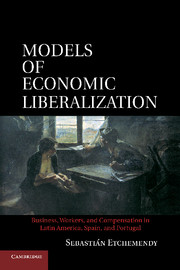 Models of Economic Liberalization
Models of Economic Liberalization Book contents
- Frontmatter
- Contents
- Acknowledgments
- Part I The Intellectual Terrain
- Part II The Political Economy of Business Adjustment
- 3 Compensating Business Insiders
- 4 Statist and Corporatist Models of Business Adjustment in Spain and Argentina
- 5 Exceptions That Prove the Rule
- Part III The Political Economy of Labor Adjustment
- Part IV The Market Model
- Part V Comparative Perspectives in Ibero-America
- 10 Conclusions
- Appendix
- Bibliography
- Index
5 - Exceptions That Prove the Rule
Variation within Countries in Models of Business Adjustment
from Part II - The Political Economy of Business Adjustment
Published online by Cambridge University Press: 07 October 2011
- Frontmatter
- Contents
- Acknowledgments
- Part I The Intellectual Terrain
- Part II The Political Economy of Business Adjustment
- 3 Compensating Business Insiders
- 4 Statist and Corporatist Models of Business Adjustment in Spain and Argentina
- 5 Exceptions That Prove the Rule
- Part III The Political Economy of Labor Adjustment
- Part IV The Market Model
- Part V Comparative Perspectives in Ibero-America
- 10 Conclusions
- Appendix
- Bibliography
- Index
Summary
Introduction
and explained the Statist and Corporatist models of business adjustment in Argentina and Spain through both national and sectoral evidence. In the Statist mode, the government organized top-down reconversion plans based on the allocation of subsidies that benefited companies in important sectors such as steel, shipbuilding, home appliances, and aluminum. However, the main established private firms in the sectors subjected to restructuring were eventually wiped out of the market. In Argentina’s Corporatist model, by contrast, the state funneled market-share compensation (i.e., state assets and partial deregulation) to local private companies in the heavy industrial sectors of autos, oil, steel, aluminum, cement, and pharmaceuticals. Building upon these market reserves, formerly protected actors initially thrived in the liberalized economy.
This chapter aims to illuminate a second form of variation in the modes of business adjustment. In terms of the book’s general research design, at a national level, each alternative reform model obviously constitutes a “negative” case of the others. In addition, the case studies that follow indicate variation within countries, that is, core ISI sectors that were not compensated according to the prevalent national model of business adjustment. Correspondingly, these “negative” cases should display a parallel variation in the main explanatory variable within democratic cases – the power of state and private business as they emerged from the ISI model. Unlike in the case of labor – in which adjustment models were more homogeneous nationally – two important basic ISI sectors, petrochemicals and oil, deviated from the general pattern of compensation in Argentina and Spain ().
- Type
- Chapter
- Information
- Models of Economic LiberalizationBusiness, Workers, and Compensation in Latin America, Spain, and Portugal, pp. 126 - 150Publisher: Cambridge University PressPrint publication year: 2011


